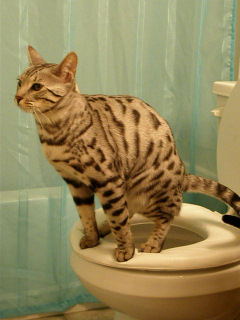Avoid Clogs and Damage: Don't Flush Cat Poop Down Your Toilet - Expert Recommendations
Avoid Clogs and Damage: Don't Flush Cat Poop Down Your Toilet - Expert Recommendations
Blog Article
We have uncovered this great article about Can You Flush Cat Poo or Litter Down the Toilet? below on the web and think it made sense to discuss it with you on this page.

Introduction
As cat proprietors, it's necessary to be mindful of just how we throw away our feline pals' waste. While it may appear convenient to purge feline poop down the commode, this method can have harmful effects for both the atmosphere and human wellness.
Environmental Impact
Purging cat poop introduces harmful microorganisms and bloodsuckers into the water system, posing a considerable threat to aquatic communities. These impurities can adversely impact marine life and concession water top quality.
Health Risks
In addition to environmental concerns, flushing cat waste can also position wellness threats to people. Feline feces might have Toxoplasma gondii, a bloodsucker that can trigger toxoplasmosis-- a potentially severe ailment, specifically for expecting women and people with weakened body immune systems.
Alternatives to Flushing
Luckily, there are safer and extra accountable ways to take care of feline poop. Take into consideration the complying with choices:
1. Scoop and Dispose in Trash
The most typical approach of throwing away cat poop is to scoop it into an eco-friendly bag and toss it in the trash. Make sure to use a devoted litter inside story and take care of the waste immediately.
2. Use Biodegradable Litter
Opt for biodegradable feline litter made from materials such as corn or wheat. These clutters are environmentally friendly and can be safely taken care of in the trash.
3. Bury in the Yard
If you have a lawn, take into consideration burying feline waste in an assigned location far from vegetable gardens and water sources. Make sure to dig deep sufficient to stop contamination of groundwater.
4. Mount a Pet Waste Disposal System
Invest in a pet waste disposal system specifically developed for feline waste. These systems utilize enzymes to break down the waste, decreasing odor and environmental impact.
Conclusion
Responsible pet possession expands past supplying food and shelter-- it also entails correct waste administration. By refraining from purging pet cat poop down the commode and going with alternate disposal methods, we can minimize our environmental impact and protect human wellness.
Why You Should Never Flush Cat Poop Down the Toilet
A rose by any other name might smell as sweet, but not all poop is created equal. Toilets, and our sewage systems, are designed for human excrement, not animal waste. It might seem like it couldn’t hurt to toss cat feces into the loo, but it’s not a good idea to flush cat poop in the toilet.
First and foremost, assuming your cat uses a litter box, any waste is going to have litter on it. And even the smallest amount of litter can wreak havoc on plumbing.
Over time, small amounts build up, filling up your septic system. Most litter sold today is clumping; it is made from a type of clay that hardens when it gets wet. Ever tried to scrape old clumps from the bottom of a litter box? You know just how cement-hard it can get!
Now imagine just a small clump of that stuck in your pipes. A simple de-clogger like Drano isn’t going to cut it. And that means it’s going to cost you big time to fix it.
Parasitic Contamination
Believe it or not, your healthy kitty may be harboring a nasty parasite. Only cats excrete Toxoplasma in their feces. Yet it rarely causes serious health issues in the cats that are infected. Most people will be fine too if infected. Only pregnant women and people with compromised immune systems are at risk. (If you’ve ever heard how women who are expecting are excused from litter cleaning duty, Toxoplasma is why.)
But other animals may have a problem if infected with the parasite. And human water treatment systems aren’t designed to handle it. As a result, the systems don’t remove the parasite before discharging wastewater into local waterways. Fish, shellfish, and other marine life — otters in particular — are susceptible to toxoplasma. If exposed, most will end up with brain damage and many will die.
Depending on the species of fish, they may end up on someone’s fish hook and, ultimately on someone’s dinner plate. If that someone has a chronic illness, they’re at risk.
Skip the Toilet Training
We know there are folks out there who like to toilet train their cats. And we give them props, it takes a lot of work. But thanks to the toxoplasma, it’s not a good idea.

I hope you enjoyed reading our topic on How to Dispose of Cat Poop and Litter Without Plastic Bags. Many thanks for taking a few minutes to browse our content. Appreciated our blog posting? Please share it. Help somebody else check it out. Thanks so much for taking the time to read it.
Call Today Report this page